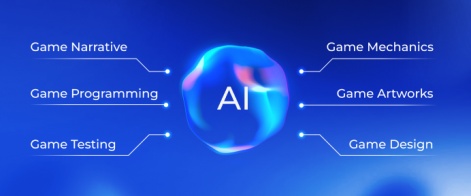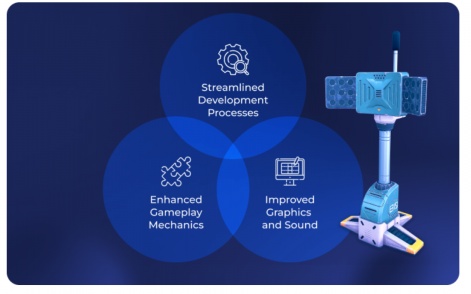Video game development has come a long way in the past few decades. From pixelated graphics and simple gameplay to immersive 3D environments and complex storytelling, the evolution of video games has been nothing short of extraordinary. However, one of the most significant advancements in the gaming industry has been the integration of artificial intelligence (AI).
AI has already revolutionised how we play games, making them more challenging, realistic, and engaging. From NPCs that behave like real humans to intelligent enemies that adapt to our gameplay, AI has opened up a whole new world of possibilities for game developers.
In a series of articles exclusively for PG.biz iLogos Game Studios founder Alexander Goldybin explores the role of AI in game development, its impact on the industry, and how game developers can leverage this technology to create better games.
AI in different fields of game development

In this series we will explore the various ways AI is being utilised in different fields of game development. From strategy games to open-world adventures, we will examine how AI is being used to improve game mechanics, enhance storytelling, and create more dynamic and realistic game worlds.
Whether you are a seasoned game developer or just starting out, this chapter will give you valuable insights into the exciting world of AI in game development.
Game design
AI has revolutionised game development by enhancing various aspects, including game design. Developers can create more dynamic and engaging gameplay experiences by leveraging AI algorithms. AI assists in procedural content generation, automatically creating game levels, characters, and environments, thereby saving time and effort. Additionally, AI-powered design tools enable developers to simulate player behaviour, improving game balancing and difficulty tuning. Machine learning algorithms can analyse player data to understand preferences and tailor game design elements accordingly. From generating realistic landscapes to optimising game mechanics, AI has become an indispensable tool in game design, enabling developers to create immersive and captivating experiences for players.
Game mechanics
AI's influence on game mechanics has revolutionised the industry.Alexander Goldybin
AI has significantly impacted game development, particularly in the realm of game mechanics. With the integration of AI, developers can create more intelligent and adaptive gameplay experiences. AI algorithms enable the creation of non-player characters (NPCs) with advanced behaviours, enhancing the realism and challenge of in-game opponents. AI-powered systems can analyse player actions in real-time, allowing for dynamic adjustments to difficulty levels and providing personalised experiences.
Furthermore, machine learning techniques can be applied to optimise game mechanics, such as pathfinding algorithms for efficient navigation or procedural generation algorithms for generating diverse and engaging content. AI's influence on game mechanics has revolutionised the industry, offering players more immersive and interactive gameplay.
Game narrative
AI has emerged as a game-changer in the field of game narrative development. Game developers can create more immersive and personalised storytelling experiences by harnessing AI technologies. Natural Language Processing (NLP) algorithms enable dynamic dialogue systems that can generate contextually relevant responses and create a sense of realism. AI-powered story generators can dynamically adapt narratives based on player choices, ensuring each player's unique and engaging experience. Additionally, sentiment analysis and emotion recognition algorithms allow for more nuanced character development and storytelling. AI in game narrative opens up exciting possibilities for interactive storytelling, making games more engaging, emotionally impactful, and memorable.
Game Testing
AI has revolutionised game development by introducing innovative approaches to game testing. With the aid of AI algorithms, developers can streamline and optimise the testing process. AI-powered automated testing systems can simulate various player scenarios, thoroughly exploring different paths and uncovering potential bugs and glitches more efficiently than traditional manual testing. Machine learning algorithms can learn from vast amounts of gameplay data to identify patterns and anomalies, enabling developers to improve game performance and stability. AI also aids in load testing, ensuring games can handle high player volumes without experiencing performance issues. By leveraging AI in game testing, developers can deliver more polished and reliable gaming experiences.
Benefits of using AI in game development

Game development has come a long way since the days of Pong and Space Invaders. Today, game developers have a wide range of tools and technologies at their disposal to create immersive gaming experiences. One technology that has gained a lot of attention in recent years is artificial intelligence (AI). AI has the potential to revolutionise game development in many ways, from improving gameplay mechanics to enhancing graphics and sound. In this chapter, we'll explore some of the benefits of using AI in game development.
“The benefits of using AI in game development are numerous. First, it enhances the user experience by providing more intelligent and dynamic gameplay. AI can create realistic and challenging opponents, adapt to player behaviour, and generate personalised content. Secondly, it optimises and accelerates the development process by automating tasks such as level design, asset creation, and bug testing. This allows developers to focus on more creative and strategic aspects of game development. Lastly, with the help of generative AI, it simplifies the iteration process by generating and refining game content, making it easier for developers to experiment and iterate on their ideas”, Egor Piskunov, head of development at iLogos Game Studios
Enhanced gameplay mechanics
One of the most significant benefits of using AI in game development is the potential to enhance gameplay mechanics. AI can help developers create more sophisticated and intelligent opponents, making games more challenging and engaging for players. For example, AI can be used to create opponents that adapt to the player's behaviour, making the game more challenging as the player becomes more skilled.
AI can also be used to create more realistic and immersive environments. For example, AI-powered physics engines can create more realistic movements and interactions between objects in the game, making the game feel more lifelike. Additionally, AI can create more realistic and dynamic weather and lighting effects, which can help create a more immersive gaming experience.
Finally, AI can help to create more personalised experiences for players. By analysing player behaviour and preferences, AI can create customised game experiences that cater to individual players. This can increase player engagement and improve player retention, ultimately leading to more successful games.
Improved graphics and sound
Another major benefit of using AI in game development is the potential to improve graphics and sound. AI tools can create more realistic and detailed graphics, such as lifelike character animations and dynamic lighting effects. Additionally, it can reduce the workload on artists and designers by automating certain tasks, such as generating textures and creating realistic landscapes.
AI can also enhance sound in games. For example, to create more realistic sound effects, such as the sound of footsteps on different surfaces or the sound of wind blowing through trees. Additionally, AI can automatically generate music and soundscapes that are tailored to the game's environment and atmosphere.
Streamlined development processes
Finally, AI can help streamline game development processes, making it easier and faster for developers to create high-quality games. Such as automatically generating game levels, reducing the workload on designers and allowing them to focus on more creative aspects of the game. Additionally, AI can automate testing and bug-fixing processes, saving developers time and improving the game's overall quality.
AI can also optimise game performance, ensuring that games run smoothly on various devices and platforms. By analysing hardware and software specifications, AI can automatically adjust game settings to ensure optimal performance and reduce the risk of crashes or other technical issues.
By streamlining game development processes, AI can help developers create high-quality games more efficiently, ultimately leading to more successful games and a more profitable game development industry.
Is it necessary to use AI in game development?
The combination of human creativity, expertise, and the ability to empathise with players will continue to be essential for the creation of unique and compelling gaming experiencesNikolay Minaiev
“Not using AI is also a valid option. The question lies in how relevant it is to remain competitive and in which use cases. For example, in AAA productions, the use of generative AI is currently more optional. However, in mobile games, there are more opportunities to utilize generative AI for texts, artworks, programming, etc. Mobile game developers greatly limit their competitiveness by not embracing generative AI, while others gain a significant competitive advantage”, Alexander Goldybin founder and chairman of the board at iLogos Game Studios
Will AI replace game developers?
“While AI has made significant advancements in various fields, including game development, it is unlikely that AI can completely replace game developers in the near future. Game development is a highly creative and multidisciplinary process that involves various aspects, such as storytelling, art design, gameplay mechanics, level design, and sound engineering.
AI can certainly assist game developers in certain areas, such as procedural content generation, bug detection, playtesting, and even providing design suggestions based on existing data.
However, game development also requires human creativity, intuition, and a deep understanding of player experiences. While AI can augment and streamline certain aspects of game development, it is unlikely to replace game developers entirely. The combination of human creativity, expertise, and the ability to empathise with players will continue to be essential for the creation of unique and compelling gaming experiences”, Nikolay Minaiev CEO and board member at iLogos Game Studios.
Click here for Part Two with details AI based game mechanics and how best to incorporate them into your next title.
Edited by Paige Cook























